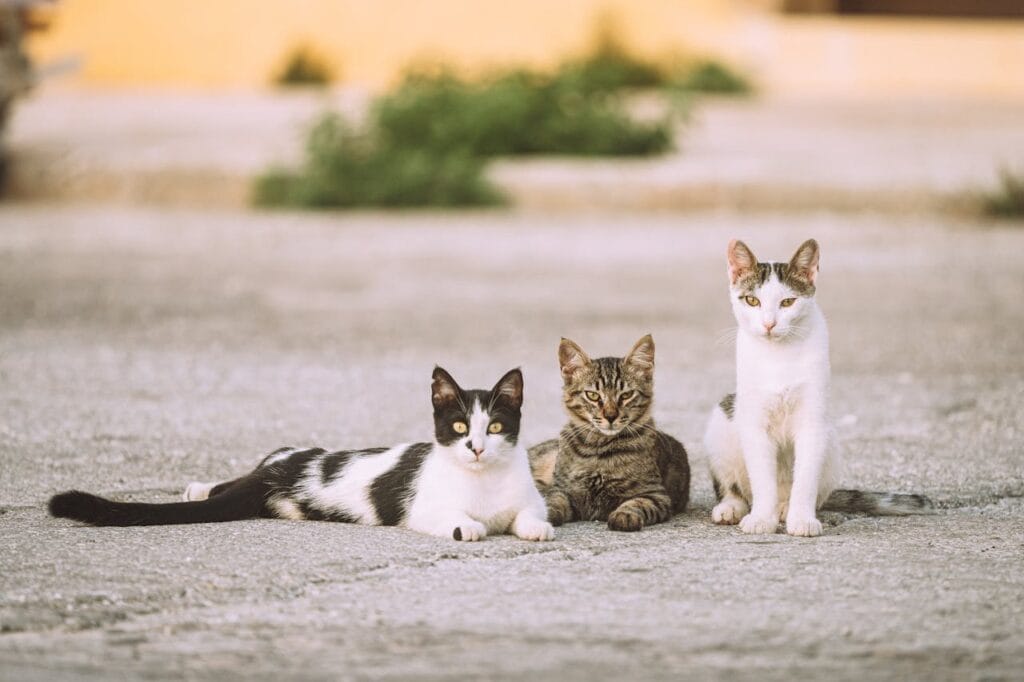The Ultimate Guide to Masterfully Managing Stress in Cats: Are You Ready to Help Your Feline Thrive?
As pet owners, we all want our cats to be happy and healthy. However, stress in cats is a common problem that can lead to a range of health issues. In this ultimate guide, we’ll explore everything you need to know about stress in cats, including the causes, symptoms, and treatment options.
Live Pee Free! Odor Eliminator 100% Eliminates Pet Odor on Contact. 20% Off. No Enzymes, No Fragrance, No Detergent, No Bleach – Safe for Kids and Pets.Table of Contents
Causes of Stress in Cats
Environmental Changes
Cats are creatures of habit, and any change in their environment can cause stress in cats. This could include moving house, new furniture, or even a change in routine. When cats face these disruptions, their natural instincts make them wary, which can lead to heightened stress levels. The introduction of new scents, sounds, and sights can overwhelm a cat’s senses, creating a feeling of insecurity.
Lack of Socialization
Cats are social animals and need interaction with both humans and other cats. A lack of socialization can lead to stress in cats and anxiety. Kittens that are not exposed to various social situations may grow into adults that find new experiences daunting. Social interactions are crucial during the formative months of a kitten’s life, and inadequate exposure to humans, other animals, and different environments can lead to lifelong anxiety issues.
Health Issues
Cats that are in pain or discomfort may become stressed as a result. Chronic conditions like arthritis, dental problems, or even minor ailments can cause significant stress in cats. Regular vet check-ups are crucial to ensure that your cat’s health issues are managed appropriately. An undiagnosed health issue can lead to chronic pain and discomfort, significantly affecting a cat’s quality of life.
Fear and Anxiety
Loud noises, unfamiliar people, and other stressful situations can cause fear and anxiety in cats. Fireworks, thunderstorms, or even a new visitor in the home can be distressing for cats, leading to behaviors such as hiding or aggression. Cats have acute hearing and are particularly sensitive to sudden, loud noises, which can trigger a flight-or-fight response.
Conflicts with Other Pets
If there are multiple pets in the household, territorial disputes or personality clashes can contribute to stress in cats. Cats are territorial by nature, and introducing a new pet can upset the established hierarchy, leading to stress in cats. Even existing pets can sometimes develop conflicts, especially if there is competition for resources like food, water, and litter boxes.
Inadequate Stimulation
Boredom and lack of mental stimulation can make a cat feel stressed, leading to behavioral issues. Cats need both physical and mental exercise to stay healthy and happy. Without sufficient stimulation, they can become lethargic or exhibit destructive behaviors. Engaging your cat with various activities can prevent boredom and keep their mind sharp.
Other Potential Causes
- Changes in Family Dynamics: The addition of a new baby or the departure of a family member can be stressful for cats. They may feel neglected or unsure about their role in the family structure.
- Travel: Car rides and trips to the vet can be highly stressful experiences for cats, especially those not accustomed to traveling. Motion sickness and the unfamiliar environment of a car can exacerbate their anxiety.
- Litter Box Issues: A dirty litter box, changes in litter type, or moving the litter box to a different location can stress a cat. Cats are particular about their bathroom habits, and any disruption to their litter box routine can cause significant distress.
Symptoms of Stress in Cats
Changes in Behavior
If your cat is acting differently than usual, such as being more withdrawn or aggressive, it could be a sign of stress in cats. Behavioral changes are often the first indicators of stress, so it’s essential to monitor your cat’s usual demeanor closely. Increased aggression or uncharacteristic timidity can indicate that something is wrong.
Loss of Appetite
Cats that are stressed may lose their appetite or refuse to eat altogether. A sudden change in eating habits is a red flag that something may be wrong. Prolonged lack of appetite can lead to serious health issues such as hepatic lipidosis, a potentially fatal liver condition.
Increased Grooming
Stress can cause cats to groom themselves excessively, which can lead to skin irritations and other health issues. Over-grooming often results in bald patches and sores, which can become infected if not treated. Cats may use grooming as a coping mechanism, akin to humans biting their nails.
Urinary Issues
Stress can also lead to urinary problems in cats, such as urinating outside of the litter box or having accidents in the house. This can be due to stress-induced cystitis, a painful condition that affects the urinary bladder. Persistent urinary issues warrant a visit to the vet to rule out any underlying health problems.
Vocalization
Increased or unusual vocalization, such as excessive meowing or growling, can be a sign of stress. Cats may use vocalization to express their discomfort or anxiety. Unusual sounds, especially at odd hours, can indicate that your cat is trying to communicate its distress.
Hiding or Isolation
Cats may hide more often or avoid social interactions when they are stressed. This is a natural survival instinct, but when it happens frequently, it indicates that the cat is not feeling secure in its environment. Prolonged periods of isolation can also lead to depression in cats.
Digestive Issues
Vomiting or diarrhea can sometimes be a sign of stress in cats. These symptoms can also indicate other health issues, so it’s important to consult a veterinarian if they occur. Stress can disrupt a cat’s digestive system, leading to discomfort and further stress.
Excessive Shedding
Increased shedding can occur when a cat is experiencing high levels of stress in cats. While some shedding is normal, excessive hair loss can signal that your cat is under significant stress. Stress can trigger the release of hormones that affect the hair growth cycle.
Other Symptoms
- Aggression: Sudden aggression towards other pets or humans can be a stress response. This behavior might be a way for the cat to assert dominance or protect its territory.
- Changes in Sleep Patterns: Sleeping more or less than usual can indicate stress in cats. While cats are known for their long naps, a significant change in sleep habits should be noted.
- Body Language: Signs like flattened ears, a tucked tail, or dilated pupils can signal stress. Understanding your cat’s body language can help you identify stress early and take action.
Treatment Options for Stress in Cats
Environmental Enrichment
Providing your cat with toys, scratching posts, and other forms of enrichment can help to reduce stress in cats. Interactive toys that stimulate your cat’s hunting instincts can be particularly beneficial. Cat trees and climbing structures can also provide both mental and physical exercise.
Routine
Establishing a regular routine can help your cat feel more secure and reduce stress. This includes regular feeding times, play sessions, and quiet time. Consistency in daily activities helps cats predict what will happen next, reducing anxiety.
Socialization
Encouraging your cat to interact with humans and other cats can help to reduce stress and anxiety. Positive interactions and gentle handling can build your cat’s confidence. Playdates with other friendly cats and controlled introductions to new people can enhance social skills.
Medication
In severe cases, medication may be necessary to help manage stress in cats. Always consult your veterinarian before administering any medication. Anti-anxiety medications and natural supplements like pheromone diffusers can be effective.
Safe Spaces
Create safe, quiet spaces where your cat can retreat and feel secure. This can be a cozy bed, a secluded corner, or a cat tree with hiding spots. Safe spaces provide a sanctuary where your cat can escape from stressors.
Pheromone Products
Synthetic feline pheromones, available in sprays or diffusers, can help to calm your cat and reduce stress. These products mimic natural pheromones, creating a sense of security and well-being.
Dietary Adjustments
Sometimes, dietary changes or supplements recommended by your vet can help to manage stress and improve overall health. Special diets designed to reduce anxiety can be beneficial.
Behavior Modification
Working with a cat behaviorist can help address specific stress-related behaviors. Behaviorists can provide customized strategies to reduce stress and improve your cat’s quality of life.
Other Treatment Options
- Therapeutic Massages: Gentle massages can help relax your cat and reduce stress.
- Aromatherapy: Certain scents like lavender and chamomile can have calming effects on cats.
- Music Therapy: Playing calming music can help soothe a stressed cat.
Preventing Stress in Cats
Gradual Changes
Introduce any changes to your cat’s environment or routine gradually to minimize stress. Sudden changes can be overwhelming, so it’s important to allow your cat time to adjust.
Positive Reinforcement
Use positive reinforcement to encourage good behavior and create positive associations with new experiences. Reward your cat with treats, praise, or playtime when they remain calm in a stressful situation.
Regular Exercise
Keep your cat active with regular playtime and exercise to help reduce stress and anxiety. Interactive play sessions with toys that mimic prey can provide both mental and physical stimulation.
Monitor Health
Regular veterinary check-ups can help to identify and address any health issues before they become a source of stress. Preventive care is essential for maintaining your cat’s overall well-being.
Provide Companionship
Ensure your cat has enough social interaction, either with you, other pets, or through supervised outdoor time. Companionship can reduce loneliness and provide mental stimulation.
Enrich the Environment
Provide a stimulating environment with plenty of toys, scratching posts, and climbing opportunities. Rotate toys regularly to keep your cat interested and engaged.
Safe Outdoor Access
If possible, provide safe outdoor access with a catio or supervised walks on a leash. Outdoor exploration can provide mental and physical enrichment, reducing indoor stress.

Stress Reduction Products
Consider using products designed to reduce stress, such as calming collars, anxiety wraps, or herbal supplements. These products can provide additional support for a stressed cat.
Training and Socialization
Regular training and socialization from a young age can help prevent stress-related behaviors. Expose your cat to various experiences in a controlled and positive manner.
Mindful Interaction
Be mindful of your interactions with your cat. Avoid forcing them into situations that cause stress and always approach them calmly and gently.
Address Behavioral Issues Early
Early intervention is key to preventing stress-related behaviors from becoming ingrained. If you notice signs of stress, address them promptly with the help of a veterinarian or behaviorist.

Advanced Strategies for Managing Stress in Cats
To further support your cat’s mental and physical health, here are additional advanced strategies to manage and alleviate stress:
Interactive Play and Exercise
Interactive play is a powerful tool for reducing stress in cats. Engage your cat in regular play sessions using a variety of toys that mimic prey, such as feather wands, laser pointers, and small balls. These activities stimulate your cat’s hunting instincts, providing both physical exercise and mental stimulation. Aim for at least two 15-minute play sessions per day to keep your cat active and engaged.
Training and Enrichment Activities
Training your cat using positive reinforcement techniques can be a fun and enriching experience. Teach your cat simple commands and tricks, rewarding them with treats or praise. Enrichment activities, such as puzzle feeders and interactive games, challenge your cat’s mind and keep them occupied. This not only reduces boredom but also helps to alleviate stress in cats.
Safe Outdoor Exploration
If your cat enjoys the outdoors, consider creating a safe outdoor environment for them. A secure cat enclosure or “catio” allows your cat to experience the sights, sounds, and smells of the outdoors without the risks associated with free roaming. Additionally, training your cat to walk on a leash can provide a controlled way for them to explore the outside world while staying safe.
Aromatherapy and Calming Aids
Aromatherapy can be beneficial for calming stress in cats. Products containing natural calming scents, such as lavender or chamomile, can be used in your home. Additionally, there are cat-specific calming aids available, including pheromone diffusers, sprays, and calming collars. These products release synthetic versions of the calming pheromones that cats naturally produce, helping to create a sense of security.
Environmental Adjustments
Making adjustments to your cat’s environment can have a significant impact on reducing stress. Ensure that your cat has access to multiple resting places, vertical spaces, and hiding spots. Cats feel safer when they can observe their environment from an elevated position or retreat to a secluded area. Providing a variety of textures and surfaces for scratching can also help to satisfy your cat’s natural behaviors and reduce stress in cats.
Regular Grooming
Regular grooming sessions can be soothing for your cat and help to strengthen the bond between you. Brushing your cat removes loose fur and prevents matting, which can be uncomfortable and stressful. Additionally, grooming provides an opportunity for you to check your cat’s skin and coat for any signs of health issues.
Socialization with Other Pets
If you have multiple pets, fostering positive interactions between them is crucial. Gradually introduce new pets and supervise their interactions to prevent conflicts. Reward calm and friendly behavior with treats and praise. Ensuring each pet has its own space and resources can help to reduce competition and stress in cats.
Monitoring and Adjusting Diet
Diet plays a vital role in your cat’s overall health and well-being. Consult with your veterinarian to ensure your cat’s diet is balanced and meets its nutritional needs. In some cases, special diets or supplements designed to support stress reduction and mental health may be recommended. Proper nutrition helps to maintain your cat’s physical health and can contribute to a calmer demeanor.
Recognizing and Managing Chronic Stress
Chronic stress in cats can lead to long-term health issues in cats, such as weakened immune systems and behavioral problems. If you notice persistent signs of stress in your cats such as changes in behavior, appetite, or litter box habits, it is important to take action. Work with your veterinarian to develop a comprehensive stress management plan that addresses the underlying causes and provides ongoing support for your cat.
Educating Yourself and Ongoing Learning
Continually educate yourself about cat behavior and stress management techniques. Stay informed about the latest research and best practices in feline care. Joining online forums, reading books, and attending workshops or webinars can provide valuable insights and support from other cat owners and experts.
Conclusion
Managing stress in cats requires a proactive and multifaceted approach. By understanding the causes of stress, recognizing the symptoms, and implementing effective strategies, you can create a supportive environment where your cat can thrive. Regular play, environmental enrichment, positive social interactions, and proper nutrition are all key components of a stress-free lifestyle for your feline companion.
If you suspect your cat is experiencing stress, consult with your veterinarian for a thorough evaluation and personalized recommendations. With dedication and care, you can help your cat lead a happy, healthy, and stress-free life.
For more information on cat care and behavior, visit our website. Your cat’s well-being is our top priority!

By following this comprehensive guide, you’ll be well-equipped to manage and prevent stress in your cat, ensuring they lead a fulfilling and serene life. Remember to always pay attention to your cat’s behavior and consult with a veterinarian if you have any concerns about their health or well-being. Your proactive efforts can make a significant difference in your cat’s overall happiness and longevity.



